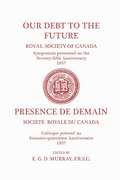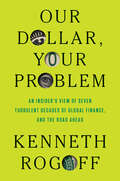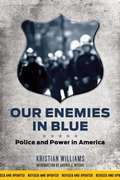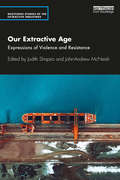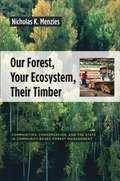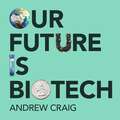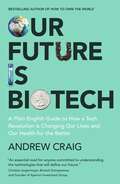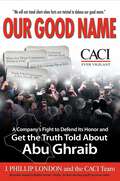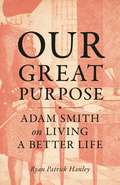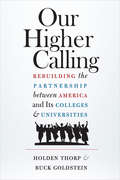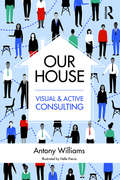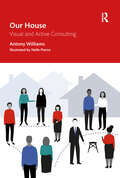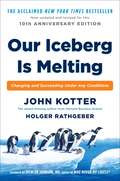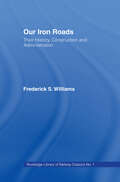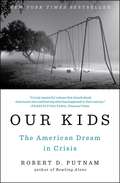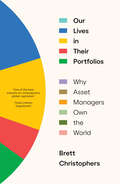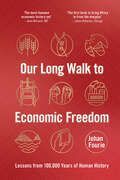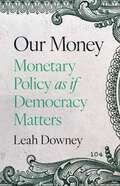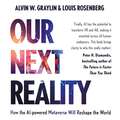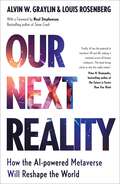- Table View
- List View
Our Debt to the Future: Royal Society of Canada, Symposium presented on the Seventy-fifth Anniversary 1957 (The Royal Society of Canada Special Publications #2)
by E.G.D. MurrayAT ITS ANNUAL MEETING in 1957, the Royal Society of Canada, celebrating the seventy-fifth anniversary of its foundation, departed from the accustomed pattern of its meetings. Instead of assembling in separate sections, Fellows from each Section of the Society were asked to contribute to a conspectus, focused by their specialized knowledge and trained discrimination, to reveal to the Society and to others certain trends and tendencies in Canada. Subjects and contributors are: "These Seventy-Five Years" (Presidential Address by W. A. Mackintosh); "The Roles of the Scientist and the Scholar in Canada's Future" (W. A. Mackintosh, David L. Thomson); "The Penalties of Ignorance of Man's Biological Dependence" (E. G. D. Murray, K. W. Neatby, I. McT. Cowan, G. H. Ettinger, R. H. Manske); "The Social Impact of Modern Technology" (N. A. M. MacKenzie, V. W. Bladen, E. W. R. Steacie, W. H. Watson); "Our Economic Potential in the Light of Science" (H. C. Gunning, J. E. Hawley, L. M. Pidgeon, B. S. Keirstead, Maurice Lamontagne); "Human Values and the Evolution of Society" (G.-H. Lévesque, T. W. M. Cameron, A. S. P. Woodhouse, R. Elie, Roy Daniells); "Let Us Look to Our Human Resources" (F. H. Underhill, J. K. W. Ferguson, L.-P. Dugal, W. B. Lewis). The volume is further prefaced by the address given by His Excellency the Right Honourable Vicent Massey, Governor-General of Canada, "The Weighing of Ayre."
Our Deepest Interests: The First Pattern in the Carpet--Exploring Lifelong Passions
by Timothy ButlerThis chapter looks at what the author calls the "Ten Basic Interests," which include the application of technology and creative production. Discovering what core interests are most important to you will allow you to better decide what kinds of challenges you want and need in your career.
Our Dollar, Your Problem: An Insider's View of Seven Turbulent Decades of Global Finance, and the Road Ahead (The Henry L. Stimson Lectures Series)
by Kenneth RogoffA leading economist explores the global rise of the U.S. dollar and shows why its future stability is far from assured &“The central argument of Our Dollar, Your Problem—that the greenback&’s pre-eminence was never guaranteed and might plausibly be overturned—could hardly be more timely.&”—The Economist Our Dollar, Your Problem argues that America&’s currency might not have reached today&’s lofty pinnacle without a certain amount of good luck. Drawing in part on his own experiences, including with policymakers and world leaders, Kenneth Rogoff animates the remarkable postwar run of the dollar—how it beat out the Japanese yen, the Soviet ruble, and the euro—and the challenges it faces today from crypto and the Chinese yuan, the end of reliably low inflation and interest rates, political instability, and the fracturing of the dollar bloc. Americans cannot take for granted that the Pax Dollar era will last indefinitely, not only because many countries are deeply frustrated with the system, but also because overconfidence and arrogance can lead to unforced errors. Rogoff shows how America&’s outsized power and exorbitant privilege can spur financial instability—not just abroad but also at home.
Our Enemies in Blue
by Kristian WilliamsLet's begin with the basics: violence is an inherent part of policing. The police represent the most direct means by which the state imposes its will on the citizenry. They are armed, trained, and authorized to use force. Like the possibility of arrest, the threat of violence is implicit in every police encounter. Violence, as well as the law, is what they represent.Using media reports alone, the Cato Institute's last annual study listed nearly seven thousand victims of police "misconduct" in the United States. But such stories of police brutality only scratch the surface of a national epidemic. Every year, tens of thousands are framed, blackmailed, beaten, sexually assaulted, or killed by cops. Hundreds of millions of dollars are spent on civil judgments and settlements annually. Individual lives, families, and communities are destroyed.In this extensively revised and updated edition of his seminal study of policing in the United States, Kristian Williams shows that police brutality isn't an anomaly, but is built into the very meaning of law enforcement in the United States. From antebellum slave patrols to today's unarmed youth being gunned down in the streets, "peace keepers" have always used force to shape behavior, repress dissent, and defend the powerful. Our Enemies in Blue is a well-researched page-turner that both makes historical sense of this legalized social pathology and maps out possible alternatives.Kristian Williams is the author of several books, including American Methods: Torture and the Logic of Domination. He co-edited Life During Wartime: Resisting Counterinsurgency, and lives in Portland, Oregon.
Our Extractive Age: Expressions of Violence and Resistance (Routledge Studies of the Extractive Industries and Sustainable Development)
by Judith ShapiroOur Extractive Age: Expressions of Violence and Resistance emphasizes how the spectrum of violence associated with natural resource extraction permeates contemporary collective life. Chronicling the increasing rates of brutal suppression of local environmental and labor activists in rural and urban sites of extraction, this volume also foregrounds related violence in areas we might not expect, such as infrastructural developments, protected areas for nature conservation, and even geoengineering in the name of carbon mitigation. Contributors argue that extractive violence is not an accident or side effect, but rather a core logic of the 21st Century planetary experience. Acknowledgement is made not only of the visible violence involved in the securitization of extractive enclaves, but also of the symbolic and structural violence that the governance, economics, and governmentality of extraction have produced. Extractive violence is shown not only to be a spectacular event, but an extended dynamic that can be silent, invisible, and gradual. The volume also recognizes that much of the new violence of extraction has become cloaked in the discourse of "green development," "green building," and efforts to mitigate the planetary environmental crisis through totalizing technologies. Ironically, green technologies and other contemporary efforts to tackle environmental ills often themselves depend on the continuance of social exploitation and the contaminating practices of non-renewable extraction. But as this volume shows, resistance is also as multi-scalar and heterogeneous as the violence it inspires. The book is essential reading for activists and for students and scholars of environmental politics, natural resource management, political ecology, sustainable development, and globalization.
Our Forest, Your Ecosystem, Their Timber: Communities, Conservation, and the State in Community-Based Forest Management
by Nicholas MenziesCommunity-based forest management (CBFM) is a model of forest management in which a community takes part in decision making and implementation, and monitoring of activities affecting the natural resources around them. CBFM provides a framework for a community members to secure access to the products and services that flow from the landscape in which they live and has become an essential component of any comprehensive approach to forest management. In this volume, Nicholas K. Menzies looks at communities in China, Zanzibar, Brazil, and India where, despite differences in landscape, climate, politics, and culture, common challenges and themes arise in making a transition from forest management by government agencies to CBFM. The stories of these four distinct places highlight the difficulties communities face when trying to manage their forests and negotiate partnerships with others interested in forest management, such as the commercial forest sector or conservation and environmental organizations. These issues are then considered against a growing body of research concerning what constitutes successful CBFM.Drawing on published and unpublished case studies, project reports, and his own rich experience, Menzies analyzes how CBFM fits into the broader picture of the management of natural resources, highlighting the conditions that bring about effective practices and the most just and equitable stewardship of resources. A critical companion for students, researchers, and practitioners, Our Forest, Your Ecosystem, Their Timber provides a singular resource on the emergence and evolution of CBFM.
Our Future is Biotech: A Plain English Guide to How a Tech Revolution is Changing Our Lives and Our Health for the Better
by Andrew Craig"An essential read for anyone committed to understanding the technologies that will define our future." CHRISTIAN ANGERMAYER, BIOTECH ENTREPRENEUR AND FOUNDER OF APEIRON INVESTMENT GROUPWelcome to the biotech revolutionIn the last century, technology has transformed the human experience across the world. This has been super-charged by the arrival of the internet, smart phones, AI and machine learning, and created trillion-plus dollar companies and household names like Apple, Amazon, Google and Microsoft.Our Future is Biotech explains why biotech is next: because our biggest remaining challenges as a species concern biological systems.Biotech companies will solve our most intractable problems, from cancer, dementia, obesity and diabetes to elderly care, mental health conditions, and even clean power generation, agricultural production and environmental degradation.Biotech means that we can all live better, safer, healthier, wealthier, happier, and longer lives.The industry has already delivered "miracle cures" for several diseases, and there is more to come. But despite this, few people are aware of the phenomenal progress being made. Our Future is Biotech addresses this, explaining what biotech is, what is coming next, and how you might profit from it too.Tech has been the most important theme for human progress for the last century. Biotech is next.
Our Future is Biotech: A Plain English Guide to How a Tech Revolution is Changing Our Lives and Our Health for the Better
by Andrew Craig"An essential read for anyone committed to understanding the technologies that will define our future." CHRISTIAN ANGERMAYER, BIOTECH ENTREPRENEUR AND FOUNDER OF APEIRON INVESTMENT GROUPWelcome to the biotech revolutionIn the last century, technology has transformed the human experience across the world. This has been super-charged by the arrival of the internet, smart phones, AI and machine learning, and created trillion-plus dollar companies and household names like Apple, Amazon, Google and Microsoft.Our Future is Biotech explains why biotech is next: because our biggest remaining challenges as a species concern biological systems.Biotech companies will solve our most intractable problems, from cancer, dementia, obesity and diabetes to elderly care, mental health conditions, and even clean power generation, agricultural production and environmental degradation.Biotech means that we can all live better, safer, healthier, wealthier, happier, and longer lives.The industry has already delivered "miracle cures" for several diseases, and there is more to come. But despite this, few people are aware of the phenomenal progress being made. Our Future is Biotech addresses this, explaining what biotech is, what is coming next, and how you might profit from it too.Tech has been the most important theme for human progress for the last century. Biotech is next.
Our Future is Biotech: A Plain English Guide to How a Tech Revolution is Changing Our Lives and Our Health for the Better
by Andrew Craig"An essential read for anyone committed to understanding the technologies that will define our future." CHRISTIAN ANGERMAYER, BIOTECH ENTREPRENEUR AND FOUNDER OF APEIRON INVESTMENT GROUPWelcome to the biotech revolutionIn the last century, technology has transformed the human experience across the world. This has been super-charged by the arrival of the internet, smart phones, AI and machine learning, and created trillion-plus dollar companies and household names like Apple, Amazon, Google and Microsoft.Our Future is Biotech explains why biotech is next: because our biggest remaining challenges as a species concern biological systems.Biotech companies will solve our most intractable problems, from cancer, dementia, obesity and diabetes to elderly care, mental health conditions, and even clean power generation, agricultural production and environmental degradation.Biotech means that we can all live better, safer, healthier, wealthier, happier, and longer lives.The industry has already delivered "miracle cures" for several diseases, and there is more to come. But despite this, few people are aware of the phenomenal progress being made. Our Future is Biotech addresses this, explaining what biotech is, what is coming next, and how you might profit from it too.Tech has been the most important theme for human progress for the last century. Biotech is next.
Our Future is Biotech: A Plain English Guide to How a Tech Revolution is Changing Our Lives and Our Health for the Better
by Andrew Craig"An essential read for anyone committed to understanding the technologies that will define our future." CHRISTIAN ANGERMAYER, BIOTECH ENTREPRENEUR AND FOUNDER OF APEIRON INVESTMENT GROUPWelcome to the biotech revolutionIn the last century, technology has transformed the human experience across the world. This has been super-charged by the arrival of the internet, smart phones, AI and machine learning, and created trillion-plus dollar companies and household names like Apple, Amazon, Google and Microsoft.Our Future is Biotech explains why biotech is next: because our biggest remaining challenges as a species concern biological systems.Biotech companies will solve our most intractable problems, from cancer, dementia, obesity and diabetes to elderly care, mental health conditions, and even clean power generation, agricultural production and environmental degradation.Biotech means that we can all live better, safer, healthier, wealthier, happier, and longer lives.The industry has already delivered "miracle cures" for several diseases, and there is more to come. But despite this, few people are aware of the phenomenal progress being made. Our Future is Biotech addresses this, explaining what biotech is, what is coming next, and how you might profit from it too.Tech has been the most important theme for human progress for the last century. Biotech is next.
Our Good Name: A Company's Fight to Defend Its Honor and Get the Truth Told About Abu Ghraib
by J. Phillip London CaciteamIn April 2004, an illegally leaked U.S. Army report thrust CACI, an information technology company, into the international spotlight by casting suspicion on a CACI employee for being "either directly or indirectly responsible" for the mistreatment of detainees at Abu Ghraib prison in Iraq. At the same time, pictures from the abuses were shown on national television and tarnished anyone associated with Abu Ghraib--including CACI.What ensued was a media frenzy rarely seen by any company in recent decades. The media twisted the unsupported allegations into a guilty verdict without regard for the facts or the truth, creating a damning public perception of CACI. Our Good Name recounts how CACI battled to defend itself against erroneous and malicious reports by a rampaging media, how it responded to the wide-ranging government investigations, and how it overcame misplaced anger and criticism that put the company's dedicated employees and excellent reputation--even it's future--at risk.Faced with constant accusations, exaggerations, and false reports, CACI refused to allow the media storm and uninformed opportunists to drag it down. The company condemned the behavior depicted in the infamous prison photos. If any employee had been culpable of any wrongdoing, the company would respond forcefully and accordingly, but only adhering to the rule of law. There would be no witch hunts, no lynch mobs, and no kangaroo courts.Spearheaded by its long-time leader, chairman, president, and CEO Dr. J. Phillip London, the company mounted a concentrated campaign to address the allegations and make the facts known. CACI used innovative methods of crisis management and consistent communications to push back against the distortions and mistakes. CACI would also rely upon its long-established, proven culture of ethics and integrity to direct its activities and set the record straight.Our Good Name is CACI's story of facing one of the biggest scandals in recent history...and coming out honorably with its head high.
Our Great Purpose: Adam Smith on Living a Better Life
by Ryan Patrick HanleyInvaluable wisdom on living a good life from the founder of modern economicsAdam Smith is best known today as the founder of modern economics, but he was also an uncommonly brilliant philosopher who was especially interested in the perennial question of how to live a good life. Our Great Purpose is a short and illuminating guide to Smith's incomparable wisdom on how to live well, written by one of today's leading Smith scholars.In this inspiring and entertaining book, Ryan Patrick Hanley describes Smith's vision of "the excellent and praiseworthy character," and draws on the philosopher's writings to show how each of us can go about developing one. For Smith, an excellent character is distinguished by qualities such as prudence, self-command, justice, and benevolence—virtues that have been extolled since antiquity. Yet Smith wrote not for the ancient polis but for the world of market society—our world—which rewards self-interest more than virtue. Hanley shows how Smith set forth a vision of the worthy life that is uniquely suited to us today.Full of invaluable insights on topics ranging from happiness and moderation to love and friendship, Our Great Purpose enables modern readers to see Smith in an entirely new light—and along the way, learn what it truly means to live a good life.
Our Higher Calling: Rebuilding the Partnership between America and Its Colleges and Universities
by Holden Thorp Buck GoldsteinThere is a growing sense of crisis and confusion about the purpose and sustainability of higher education in the United States. In the midst of this turmoil, students are frequently referred to as customers and faculty as employees, educational outcomes are increasingly measured in terms of hiring and salary metrics for graduates, and programs are assessed as profit and loss centers. Despite efforts to integrate business-oriented thinking and implement new forms of accountability in colleges and universities, Americans from all backgrounds are losing confidence in the nation's institutions of higher learning, and these institutions must increasingly confront what has proven to be an unsustainable business model. In Our Higher Calling, Holden Thorp and Buck Goldstein draw on interviews with higher education thought leaders and their own experience, inside and outside the academy, to address these problems head on, articulating the challenges facing higher education and describing in pragmatic terms what can and cannot change--and what should and should not change. They argue that those with a stake in higher education must first understand a fundamental compact that has long been at the heart of the American system: a partnership wherein colleges and universities support the development of an educated and skilled citizenry and create new knowledge in exchange for stable public investment and a strong degree of autonomy to pursue research without undue external pressure. By outlining ways to restore this partnership, Thorp and Goldstein endeavor to start a conversation that paves the way for a solution to one of the country's most pressing problems.
Our House: Visual and Active Consulting
by Antony WilliamsIn this innovative book, Antony Williams establishes a 'House' as the basic analogy for approaching many business issues, and its 'Rooms' as places to focus specialist consulting interventions. He details unique visual and active processes for each Room, and provides sturdy guidelines for conducting interventions based on vision, stage, role and action. Our House has many 'Rooms', ushering complex business issues into one area at a time. They engineer attention to task and help your clients see, think and feel their way through issues. The reader is shown how to deal with specific organisational processes in each Room: memory and the past in the Attic; business foundations in the Cellar; preparing a meal the customer would love in the Kitchen; suppliers, maintenance and low-hanging fruit in the Garden; refreshing and making good the business in the Laundry; elimination and waste goes into the Toilet; frank talk and alignment at the Dining Table; the big systems picture on the Balcony; analysis in the Study; and conversation and connection in the Living Room. A vital guide for professionals, Our House shows readers how to manage simple action methods that are vivid, clarifying, engaging and lead to high levels of alignment.
Our House: Visual and Active Consulting
by Antony WilliamsFor consultants, facilitators or OD specialists, a house’s familiar image will help their clients see, think and feel their ways solving their business issues. No need for dry and hard-to-remember management schemas. The striking visual and active methods shown here deeply engage clients – they get it right away. The House and its ‘Rooms’ make sense to them, and they willingly start working with you. The Our House model has many of these ‘Rooms’ where complex business issues are sorted into one area at a time. The focus, the mood and the process vary with each Room, and the author reveals an entirely original consulting process each time. Disciplined creativity begins: loosening the grip of the past in the Attic; testing business foundations in the Cellar; preparing a meal the customer would love in the Kitchen; suppliers, maintenance and low-hanging fruit in the Garden; the team's dirty washing in the Laundry; elimination and waste goes into the Toilet; frank talk and vision alignment take place at the Dining Table; big systems perspectives can be seen from the Balcony; analysis in the Study; conversation and connection in the Living Room. The simplicity of the images of a House and its Rooms belies their frugality and their strength. In each Room, your clients are put through something demanding yet liberating. They see things differently and they see different things. Our House shows you how to succeed with simple action methods that are enlightening and strong.
Our Iceberg Is Melting
by John Kotter Holger RathgeberA new edition of the classic business parable that has sold more than a million copies since 2006. Our Iceberg Is Melting is a simple fable about doing well in an ever-changing world. Based on the award-winning work of Harvard's John Kotter, it is a story that has been used to help thousands of people and organizations. The fable is about a penguin colony in Antarctica. A group of beautiful emperor penguins live as they have for many years. Then one curious bird discovers a potentially devastating problem threatening their home--and pretty much no one listens to him. The characters in the story, Fred, Alice, Louis, Buddy, the Professor, and NoNo, are like people we recognize--even ourselves. Their tale is one of resistance to change and heroic action, seemingly intractable obstacles and the most clever tactics for dealing with those obstacles. It's a story that is occurring in different forms all around us today--but the penguins handle the very real challenges a great deal better than most of us. Our Iceberg Is Melting is based on pioneering work that shows how Eight Steps produce needed change in any sort of group. It's a story that can be enjoyed by anyone while at the same time providing invaluable guidance for a world that just keeps moving faster and faster.From the Hardcover edition.
Our Iceberg Is Melting: Changing and Succeeding Under Any Conditions
by John Kotter Holger RathgeberA new edition of the classic business parable that has sold more than a million copies since 2006. Our Iceberg Is Melting is a simple fable about doing well in an ever-changing world. Based on the award-winning work of Harvard’s John Kotter, it is a story that has been used to help thousands of people and organizations. The fable is about a penguin colony in Antarctica. A group of beautiful emperor penguins live as they have for many years. Then one curious bird discovers a potentially devastating problem threatening their home—and pretty much no one listens to him. The characters in the story, Fred, Alice, Louis, Buddy, the Professor, and NoNo, are like people we recognize—even ourselves. Their tale is one of resistance to change and heroic action, seemingly intractable obstacles and the most clever tactics for dealing with those obstacles. It’s a story that is occurring in different forms all around us today—but the penguins handle the very real challenges a great deal better than most of us. Our Iceberg Is Melting is based on pioneering work that shows how Eight Steps produce needed change in any sort of group. It’s a story that can be enjoyed by anyone while at the same time providing invaluable guidance for a world that just keeps moving faster and faster.From the Hardcover edition.
Our Iceberg Is Melting: Changing and Succeeding Under Any Conditions
by John Kotter Holger RathgeberA new edition of the classic business parable that has sold more than a million copies since 2006. Our Iceberg Is Melting is a simple fable about doing well in an ever-changing world. Based on the award-winning work of Harvard's John Kotter, it is a story that has been used to help thousands of people and organizations. The fable is about a penguin colony in Antarctica. A group of beautiful emperor penguins live as they have for many years. Then one curious bird discovers a potentially devastating problem threatening their home--and pretty much no one listens to him. The characters in the story, Fred, Alice, Louis, Buddy, the Professor, and NoNo, are like people we recognize--even ourselves. Their tale is one of resistance to change and heroic action, seemingly intractable obstacles and the most clever tactics for dealing with those obstacles. It's a story that is occurring in different forms all around us today--but the penguins handle the very real challenges a great deal better than most of us. Our Iceberg Is Melting is based on pioneering work that shows how Eight Steps produce needed change in any sort of group. It's a story that can be enjoyed by anyone while at the same time providing invaluable guidance for a world that just keeps moving faster and faster.From the Hardcover edition.
Our Iron Roads: Their History, Construction and Administraton
by F.S. WilliamsFirst published in 1968. Routledge is an imprint of Taylor & Francis, an informa company.
Our Kids: The American Dream in Crisis
by Robert D. PutnamA New York Times bestseller and &“a passionate, urgent&” (The New Yorker) examination of the growing inequality gap from the bestselling author of Bowling Alone: why fewer Americans today have the opportunity for upward mobility.Central to the very idea of America is the principle that we are a nation of opportunity. But over the last quarter century we have seen a disturbing “opportunity gap” emerge. We Americans have always believed that those who have talent and try hard will succeed, but this central tenet of the American Dream seems no longer true or at the least, much less true than it was. In Our Kids, Robert Putnam offers a personal and authoritative look at this new American crisis, beginning with the example of his high school class of 1959 in Port Clinton, Ohio. The vast majority of those students went on to lives better than those of their parents. But their children and grandchildren have faced diminishing prospects. Putnam tells the tale of lessening opportunity through poignant life stories of rich, middle class, and poor kids from cities and suburbs across the country, brilliantly blended with the latest social-science research. “A truly masterful volume” (Financial Times), Our Kids provides a disturbing account of the American dream that is “thoughtful and persuasive” (The Economist). Our Kids offers a rare combination of individual testimony and rigorous evidence: “No one can finish this book and feel complacent about equal opportunity” (The New York Times Book Review).
Our Lives in Their Portfolios: Why Asset Managers Own the World
by Brett ChristophersAll hail the new masters of Capitalism: How asset managers acquired the world Banks have taken a backseat since the global financial crisis over a decade ago. Today, our new financial masters are asset managers, like Blackstone and BlackRock. And they don&’t just own financial assets. The roads we drive on; the pipes that supply our drinking water; the farmland that provides our food; energy systems for electricity and heat; hospitals, schools, and even the homes in which many of us live—all now swell asset managers&’ bulging investment portfolios. As the owners of more and more of the basic building blocks of everyday life, asset managers shape the lives of each and every one of us in profound and disturbing ways. In this eye-opening follow-up to Rentier Capitalism, Brett Christophers peels back the veil on &“asset manager society.&” Asset managers, he shows, are unlike traditional owners of housing and other essential infrastructure. Buying and selling these life-supporting assets at a dizzying pace, the crux of their business model is not long-term investment and careful custodianship but making quick profits for themselves and the investors that back them. In asset manager society, the natural and built environments that sustain us become one more vehicle for siphoning money from the many to the few.
Our Long Walk to Economic Freedom: Lessons from 100,000 Years of Human History
by Johan FourieOur Long Walk to Economic Freedom is an entertaining and engaging guide to global economic history told for the first time from an African perspective. In thirty-five short chapters Johan Fourie tells the story of 100,000 years of human history spanning humankind's migration out of Africa to the Covid-19 pandemic. His unique account reveals just how much we can learn by asking unexpected questions such as 'How could a movie embarrass Stalin?', 'Why do the Japanese play rugby?' and 'What do an Indonesian volcano, Frankenstein and Shaka Zulu have in common?'. The book sheds new light on urgent debates about the roots and reasons for prosperity, the march of opportunity versus the crushing boot of exploitation, and why it is the builders of society – rather than the burglars –who ultimately win out.
Our Money: Monetary Policy as if Democracy Matters
by Leah Rose Ely DowneyHow the creation of money and monetary policy can be more democraticThe power to create money is foundational to the state. In the United States, that power has been largely delegated to private banks governed by an independent central bank. Putting monetary policy in the hands of a set of insulated, nonelected experts has fueled the popular rejection of expertise as well as a widespread dissatisfaction with democratically elected officials. In Our Money, Leah Downey makes a principled case against central bank independence (CBI) by both challenging the economic theory behind it and developing a democratic rationale for sustaining the power of the legislature to determine who can create money and on what terms. How states govern money creation has an impact on the capacity of the people and their elected officials to steer policy over time. In a healthy democracy, Downey argues, the balance of power over money creation matters.Downey applies and develops democratic theory through an exploration of monetary policy. In so doing, she develops a novel theory of independent agencies in the context of democratic government, arguing that states can employ expertise without being ruled by experts. Downey argues that it is through iterative governance, the legislature knowing and regularly showing its power over policy, that the people can retain their democratic power to guide policy in the modern state. As for contemporary macroeconomic arguments in defense of central bank independence, Downey suggests that the purported economic benefits do not outweigh the democratic costs.
Our Next Reality: How the AI-powered Metaverse Will Reshape the World
by Alvin Wang Graylin Louis Rosenberg"Our Next Reality does a fantastic job of giving a balanced and insightful analysis to some of the most pressing questions our society will face in the near future. The material is data driven, digestible, and very actionable." RAY KURZWEIL, Author/Entrepreneur/Futurist"A wide-reaching exploration of the intersections between AI, VR and AR: it's a mind-opener, and a source of reflection on how transformative and still unknown the future of communication, personal technology and even personal privacy might become." SCOTT STEIN, Editor at Large, CNETOver the last 100 years, technology has changed our world. Over the next decade it will transform our reality.We are entering a new technological age in which artificial intelligence and immersive media will transform society at all levels, mediating our lives by altering what we see, hear, and experience. Powered by immersive eyewear and driven by interactive AI agents, this new age of computing has the potential to make our world a magical place where the boundaries between the real and the virtual, the human and the artificial, rapidly fade away. If managed well, this could unleash a new age of abundance. If managed poorly, this technological revolution could easily go astray, deeply compromising our privacy, autonomy, agency, and even our humanity.In Our Next Reality, two industry veterans provide a data-driven debate on whether the new world we're creating will be a technological utopia or an AI-powered dystopia and give guidance on how to aim for the best future we can. With a Foreword by renowned author Neal Stephenson and section contributions from industry thought-leaders such as Peter H. Diamandis, Tom Furness, Phillip Rosedale, Tony Parisi, Avi Bar Zeev and Walter Parkes, this book answers over a dozen of the most pressing questions we face as artificial intelligence and spatial computing accelerates the digitization of our world. Find out why our actions in the next decade could determine the trajectory of our species for countless millennia."For anyone who wants to use AI and XR to help build the future, read this book to help you skillfully navigate a future of unprecedented danger and promise." JASON HINER, Editor in Chief, ZDNet"Our Next Reality really is a must-read for anyone who wants to prepare for the massive AI and XR driven disruption coming our way." CHARLIE FINK, Author | Adjunct | Forbes Tech Columnist
Our Next Reality: How the AI-powered Metaverse Will Reshape the World
by Alvin Wang Graylin Louis RosenbergForeword by Neal Stephenson, bestselling author of Snow Crash Over the last 100 years, technology has changed our world. Over the next decade it will transform our reality. The planet is headed for a momentous upheaval, and we are not prepared. We are entering a new technological age in which artificial intelligence and immersive media will transform society at all levels, mediating our lives by altering what we see, hear, and experience. Powered by immersive eyewear and driven by interactive AI agents, this new age of computing has the potential to make our world a magical place where the boundaries between the real and the virtual, the human and the artificial, rapidly fade away. If managed well, this could unleash a new age of abundance. If managed poorly, this technological revolution could easily go astray, deeply compromising our privacy, autonomy, agency, and even our humanity. In Our Next Reality, two industry veterans provide a data-driven debate on whether the new world we're creating will be a technological utopia or an AI-powered dystopia and give guidance on how to aim for the best future we can. With a Foreword by renowned author Neal Stephenson and section contributions from industry thought-leaders such as Peter H. Diamandis, Tom Furness, Phillip Rosedale, Tony Parisi, Avi Bar Zeev and Walter Parkes, this book answers over a dozen of the most pressing questions we face as AI/VR/AR accelerates the digitization of our world. Find out why our actions in the next decade could determine the trajectory of our species for countless millennia.
